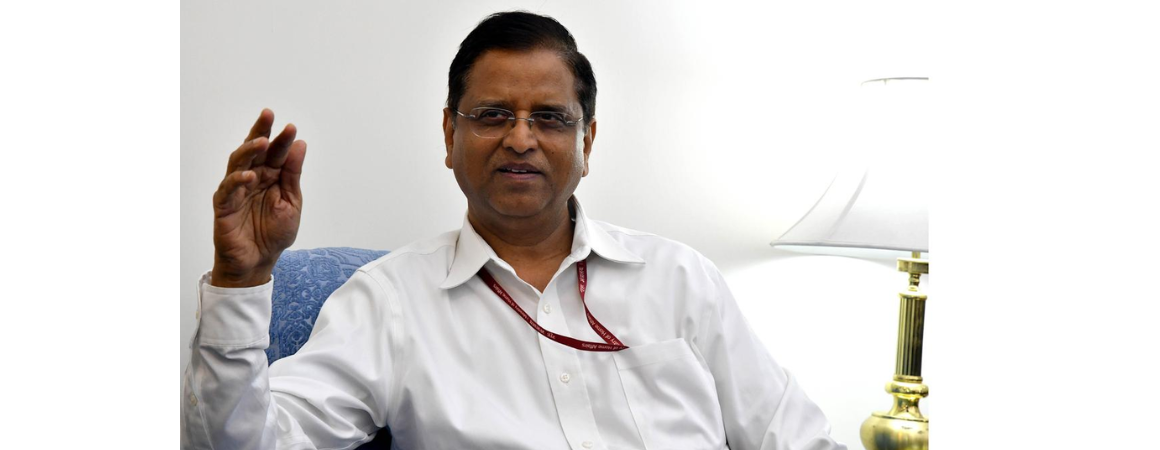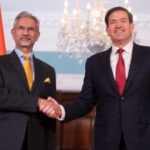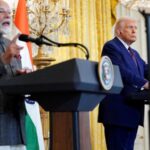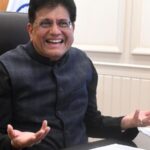In his new book, No, Minister: Navigating Power, Politics and Bureaucracy with a Steely Resolve, Garg says he was sidelined during the initial stages of the Indus Water Treaty negotiations in 2016
The Ministry of External Affairs (MEA) nearly “lost the plot” over the Indus Water Treaty talks with Pakistan in 2016, as senior MEA officials entered into a tussle with the World Bank, before the issue was retrieved — the claim is made by former Finance Secretary Subhash Chandra Garg, India-appointed Executive Director at the World Bank (2014-2017), in his latest book, which recounts for the first time the tensions between the Modi government and World Bank President Jim Kim over the Kishenganga hydropower project. The point of contention was whether the World Bank, which has a limited role in guiding any disputes or differences between India and Pakistan, would decide to appoint the “court of arbitration” Pakistan had asked for, or a “neutral expert”, as India wanted.
After his controversial first book about his unceremonious exit from the Union Finance Ministry, Mr. Garg has now taken aim at the MEA in his new book, No, Minister: Navigating Power, Politics and Bureaucracy with a Steely Resolve, where he says he was sidelined during the initial stages of the Indus Water Treaty negotiations in 2016. He also claims that he was told to “keep off the matter”, and only attend meetings to be led by India’s Deputy Chief of Mission Taranjit Sandhu (later the Ambassador to the U.S. before he retired and joined politics).
“[However], by the middle of November, the MEA team was getting nervous. It was not able to nudge the World Bank team in the direction it wanted, i.e., to appoint a neutral expert and began to sense that the Bank was tilting towards Pakistan,” Mr. Garg wrote, in the chapter titled ‘Bringing Indus Waters Arbitration Back From the Brink’.
At this point, the book claims that Mr. Jaishankar made a visit to Washington and asked Mr. Garg to take charge of matters. Mr. Garg accepted the request, but insisted that no MEA official join the discussions, and even turned back then MEA Joint Secretary Gopal Baglay (now India’s High Commissioner to Australia) from the meeting with Mr. Kim, although he had travelled non-stop for 20 hours to reach Washington.
According to Mr. Garg, it was his own intervention, in a one-on-one meeting with Mr. Kim, that eventually helped ensure a neutral expert, Ian Solomon, was appointed, after the World Bank accepted Pakistan’s demand for a court of arbitration at The Hague.
The MEA did not respond to a request for comments on Mr. Garg’s claims. The Hindu also reached out to Mr. Sandhu and Mr. Baglay for a comment, and they did not respond to or deny the claims. In Washington, World Bank officials privy to the negotiations confirmed the tussle between the World Bank and the Indian government, but said they could not comment on whether it was Mr. Garg’s meeting with the World Bank chief or other interventions that eventually changed the course of events.
The World Bank first ruled that having a neutral expert and court together could lead to “contradictory outcomes”. However, subsequently, it facilitated the setting up of both an expert as well as a Chairperson to the Court of Arbitration. India has refused to attend the proceedings in the Court of Arbitration at The Hague. Pakistan has maintained that it is working within the terms of the treaty, whereas India says the treaty does not allow such parallel dispute mechanisms.
When asked by The Hindu, Mr. Garg said this should not have been an “institutional turf battle”, and that he did not want India’s case to be “compromised” even as the World Bank, the U.S. and the U.K. had gone ahead with appointing experts to take the Pakistan application for arbitration forward. Allowing Pakistan’s diplomats to continue the process unchallenged would have an impact on other negotiations, he added.
After the Pahalgam terror attacks in April this year, India has decided to “suspend” the Indus Water Treaty, but some of the book’s revelations are significant for future decisions on similar issues. The book recounts Pakistan’s campaign against the Kishenganga and Ratle hydropower projects in Jammu-Kashmir; India’s objections to the International Monetary Fund/World Bank funding of the Gulpur hydropower project in Pakistan Occupied Kashmir; and China’s objections in 2010 to multilateral funding for a hydropower project in Arunachal Pradesh, leading Mr. Garg to conclude that the government and the World Bank needed better communication between themselves.
Mr. Garg also pointed out that Mr. Kim and Mr. Modi had a good relationship, but Mr. Kim’s plan to fund schemes for “stunted” or malnourished children had not gone down well with Mr. Modi. In Parliament this week, the Union Ministry of Women and Child Development said that about 37% of children under five years registered on their tracker were found to be stunted.
“I believe India’s approach of not fine-tuning its stance in line with World Bank policies has harmed its own interests more than serving it,” Mr. Garg, who moved to India as Economic Affairs Secretary after his tenure at the World Bank ended, said. Differences with Finance Minister Nirmala Sitharaman led to his transfer as Secretary in the Union Ministry of Power in August 2019. He applied for voluntary retirement that same day, and retired after serving the mandatory notice period on October 31, 2019.
MEA ‘nearly lost the plot’ on Indus Treaty negotiations, says former Finance Secretary Subhash Garg
In his new book, No, Minister: Navigating Power, Politics and Bureaucracy with a Steely Resolve, Garg says he was sidelined during the initial stages of the Indus Water Treaty negotiations in 2016
The Ministry of External Affairs (MEA) nearly “lost the plot” over the Indus Water Treaty talks with Pakistan in 2016, as senior MEA officials entered into a tussle with the World Bank, before the issue was retrieved — the claim is made by former Finance Secretary Subhash Chandra Garg, India-appointed Executive Director at the World Bank (2014-2017), in his latest book, which recounts for the first time the tensions between the Modi government and World Bank President Jim Kim over the Kishenganga hydropower project. The point of contention was whether the World Bank, which has a limited role in guiding any disputes or differences between India and Pakistan, would decide to appoint the “court of arbitration” Pakistan had asked for, or a “neutral expert”, as India wanted.
After his controversial first book about his unceremonious exit from the Union Finance Ministry, Mr. Garg has now taken aim at the MEA in his new book, No, Minister: Navigating Power, Politics and Bureaucracy with a Steely Resolve, where he says he was sidelined during the initial stages of the Indus Water Treaty negotiations in 2016. He also claims that he was told to “keep off the matter”, and only attend meetings to be led by India’s Deputy Chief of Mission Taranjit Sandhu (later the Ambassador to the U.S. before he retired and joined politics).
“[However], by the middle of November, the MEA team was getting nervous. It was not able to nudge the World Bank team in the direction it wanted, i.e., to appoint a neutral expert and began to sense that the Bank was tilting towards Pakistan,” Mr. Garg wrote, in the chapter titled ‘Bringing Indus Waters Arbitration Back From the Brink’.
At this point, the book claims that Mr. Jaishankar made a visit to Washington and asked Mr. Garg to take charge of matters. Mr. Garg accepted the request, but insisted that no MEA official join the discussions, and even turned back then MEA Joint Secretary Gopal Baglay (now India’s High Commissioner to Australia) from the meeting with Mr. Kim, although he had travelled non-stop for 20 hours to reach Washington.
According to Mr. Garg, it was his own intervention, in a one-on-one meeting with Mr. Kim, that eventually helped ensure a neutral expert, Ian Solomon, was appointed, after the World Bank accepted Pakistan’s demand for a court of arbitration at The Hague.
The MEA did not respond to a request for comments on Mr. Garg’s claims. The Hindu also reached out to Mr. Sandhu and Mr. Baglay for a comment, and they did not respond to or deny the claims. In Washington, World Bank officials privy to the negotiations confirmed the tussle between the World Bank and the Indian government, but said they could not comment on whether it was Mr. Garg’s meeting with the World Bank chief or other interventions that eventually changed the course of events.
The World Bank first ruled that having a neutral expert and court together could lead to “contradictory outcomes”. However, subsequently, it facilitated the setting up of both an expert as well as a Chairperson to the Court of Arbitration. India has refused to attend the proceedings in the Court of Arbitration at The Hague. Pakistan has maintained that it is working within the terms of the treaty, whereas India says the treaty does not allow such parallel dispute mechanisms.
When asked by The Hindu, Mr. Garg said this should not have been an “institutional turf battle”, and that he did not want India’s case to be “compromised” even as the World Bank, the U.S. and the U.K. had gone ahead with appointing experts to take the Pakistan application for arbitration forward. Allowing Pakistan’s diplomats to continue the process unchallenged would have an impact on other negotiations, he added.
After the Pahalgam terror attacks in April this year, India has decided to “suspend” the Indus Water Treaty, but some of the book’s revelations are significant for future decisions on similar issues. The book recounts Pakistan’s campaign against the Kishenganga and Ratle hydropower projects in Jammu-Kashmir; India’s objections to the International Monetary Fund/World Bank funding of the Gulpur hydropower project in Pakistan Occupied Kashmir; and China’s objections in 2010 to multilateral funding for a hydropower project in Arunachal Pradesh, leading Mr. Garg to conclude that the government and the World Bank needed better communication between themselves.
Mr. Garg also pointed out that Mr. Kim and Mr. Modi had a good relationship, but Mr. Kim’s plan to fund schemes for “stunted” or malnourished children had not gone down well with Mr. Modi. In Parliament this week, the Union Ministry of Women and Child Development said that about 37% of children under five years registered on their tracker were found to be stunted.
“I believe India’s approach of not fine-tuning its stance in line with World Bank policies has harmed its own interests more than serving it,” Mr. Garg, who moved to India as Economic Affairs Secretary after his tenure at the World Bank ended, said. Differences with Finance Minister Nirmala Sitharaman led to his transfer as Secretary in the Union Ministry of Power in August 2019. He applied for voluntary retirement that same day, and retired after serving the mandatory notice period on October 31, 2019.






NO COMMENT